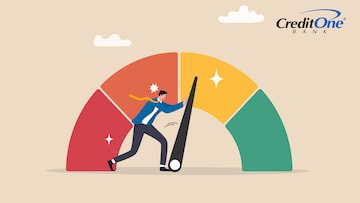January 17, 2022
Having a good credit score could open a lot of doors for you. Learn more about credit scores and credit score ranges in this article by Credit One Central.

What Is a Good Credit Score?
Credit scores—three-digit numbers used by lenders to help convey a consumer’s creditworthiness—range anywhere from 300 to 850 points. Within this range are sub-ranges described by one- or two-word ratings, and “Good” is one of these ratings.
A credit score of around 700 points is generally considered good; however, whether a credit score literally falls into the “Good” category depends on which consumer scoring model you’re using: FICO® Score or VantageScore®.
What Is a Good FICO Score?
Any score in the 670-739 range of FICO’s credit-scoring model is considered “Good,” one of the five ratings used by FICO. This scoring model was introduced by the Fair Isaac Corporation in 1989 and is used by 90% of the top lenders.1
With the FICO scoring model, a credit score below the 670-point minimum of its Good category falls into one of two categories: “Fair” or “Poor.” A score of 580 to 669 is considered Fair, while a score of 300 to 579 qualifies as Poor. If you have a credit score that resides in either of these two categories, you likely won’t qualify for many of the same credit opportunities that require at least a Good score.
On the other end of the spectrum, a credit score greater than the 739-point maximum of FICO’s Good category falls into either their “Very Good” or “Exceptional” category. A score of 740 to 799 is considered Very Good, while a score of 800 to 850 qualifies as Exceptional. A credit score in either of these two categories should qualify you for most credit opportunities requiring at least a Good score and will likely open doors for lower interest rates, higher credit limits, more lucrative credit card rewards, lower or no fees, and other more favorable terms than you may be offered with merely a Good score.
As of April 2021, the average FICO Score for an American consumer was 716, which falls squarely within FICO’s “Good” range.2
What Is a Good VantageScore?
A “Good” VantageScore, one of the five ratings used by this model, is any score falling within their 661-780 range. VantageScore was introduced in 2006 and is a joint venture of the three major credit bureaus—Experian®, Equifax®, and TransUnion®—but is managed by VantageScore Solutions, an independent company.
With VantageScore, any score below the 661-point lower limit of its Good category falls into one of three categories (unlike two with FICO Score): “Fair,” “Poor,” or “Very Poor.” A score of 601 to 660 is considered Fair, while any score falling into the 500-600 range is considered Poor. Any score between 300 and 499 falls into the bottom category of Very Poor. If you have a credit score residing in any of these lower ranges, you are not likely to qualify for credit that requires a minimum of a Good score.
Whereas FICO Score has two categories above their Good category, VantageScore has only one: “Excellent.” Any score above the 780-point upper limit of VantageScore’s Good category qualifies as Excellent. An Excellent VantageScore is likely to qualify you for most credit requiring a minimum of a Good score, plus additional credit opportunities, better perks, higher credit limits, and more advantageous interest rates and terms.
As of July 2021, the average VantageScore in America was 697, which resides in VantageScore’s “Good” range.3
Why Credit Scores & Credit Score Ranges Matter
If you’re applying for credit, the range and category your FICO Score or VantageScore falls within could affect you in the following ways:
- Your credit score may determine whether you are approved for credit.
If your credit score meets or exceeds a lender’s minimum credit score requirement, you’re in the running for being approved for credit. On the other hand, if it falls below their minimum requirement, chances are your application will be denied. - Your credit score may determine the type of credit you are offered.
Higher credit scores typically open doors for more advantageous types of credit. For example, rewards credit cards that offer cash back rewards, points, travel miles, and other perks typically have higher minimum credit score requirements. - Your credit score may determine how much credit you are offered.
If you’re applying for installment credit, like a mortgage or auto loan, a higher credit score may qualify you for a larger loan. If you’re applying for revolving credit, like a credit card, the range your credit score falls in may determine the credit limit you’re offered. - Your credit score may determine the interest rate and terms you are offered.
A higher credit score could get you a more advantageous interest rate and more favorable loan terms, such as lower or no fees, or a better loan repayment period. However, even if you’re approved for credit, a lower credit score could result in higher interest rates or less favorable terms. - Your credit may affect your employment, auto insurance, or the rent you pay.
Depending on where you reside, some employers may check your credit reports (credit scores are derived from the information in these reports) before offering you employment. Auto insurance providers may also base your premium on your credit-based insurance score, depending on which state you live in. Some landlords also check the credit scores of potential renters. Good credit suggests that you’ve managed debt responsibly, which may paint you as a more attractive applicant to employers, insurers, and landlords.
Credit Score FAQs
- What is a good credit score for buying a home?
The actual credit score you’ll need to buy a house varies by lender and loan type, but a score of 620 or higher will typically qualify you for a mortgage.4 Of course, other factors, such as your income, also play a big role. You may also be able to qualify for a mortgage with a lower credit score if you qualify for government-backed loans. - What is a good credit score for buying a car?
A FICO® Auto Score is a specialized FICO score many lenders use to make lending decisions on auto loans. Many lenders consider a FICO Auto Score of 700 or higher a good credit score for qualifying for an auto loan with lower interest rates.5 Again, other factors like income also contribute to whether an applicant will ultimately be approved or denied for an auto loan. - What is a good credit score for renting an apartment?
Where and what type of place you’re trying to rent greatly affects the answer to this question. According to Experian, renters in high-priced apartment buildings had an average credit score of 669, while renters in mid-range buildings possessed an average of 626, and renters in low-cost apartments had an average credit score of 597.6 - What is a good credit score for getting a credit card?
The answer to this question depends on the type of credit card you want. There is a credit card out there for just about any credit score, including secured credit cards for those with low credit scores or no credit scores at all. The higher your credit score is, the better your chances of being approved—and the more likely you are to be approved for a card that offers more and better perks.
How to Get a Good Credit Score
- Build a positive payment history.
The number-one factor in determining credit score—both FICO Score and VantageScore—is payment history. And paying your creditors on time, every time is the best way to build a positive credit history. - Check your credit reports for inaccuracies and dispute any errors.
Your credit scores are based on the information in your credit reports. If that information is incorrect and paints an unfavorable picture of your credit management, it could be preventing you from getting the credit you deserve. - Maintain a healthy credit utilization ratio.
This ratio conveys how much of your available revolving credit you’re using. If it’s over 30%, potential lenders may see you as overleveraged and too much of a risk. Paying down credit card balances can help lower this ratio, which could give your credit score a bump. - Apply for new credit sparingly.
Every time you apply for credit, a hard inquiry is typically generated, which can lower your credit score by as many as 10 points.7 To avoid taking too many of these hits, when shopping for credit cards, first see if you pre-qualify—which doesn’t generate a hard inquiry—before actually applying. - Don’t close older credit accounts.
The average age of credit accounts is factored into calculating credit scores. Even if you’re not using them, older accounts could be contributing toward a higher credit score. Their credit lines are also used to calculate credit utilization ratio, and credit cards with high limits but low or no balance help lower this ratio. - Increase existing credit card limits but don’t use the available credit.
Increasing your available revolving credit but not using it can help lower your credit utilization ratio, which we now know can help raise your credit score. - Add to your credit mix.
The types of credit you have influence your credit scores. A more diverse mix can help raise your credit score. Consider adding revolving or installment credit to your mix if you’re lacking one of these types of credit. But only if it makes sense; don’t take on additional debt to raise your credit score.
Having a good credit score offers plenty of advantages with no real downside. By following these tips, you should be able to push your FICO Score and VantageScore into the “Good” category or even higher!
SOURCES
- https://www.myfico.com/credit-education/fico-scores-vs-credit-scores
- https://www.fico.com/blogs/average-us-ficor-score-716-indicating-improvement-consumer-credit-behaviors-despite-pandemic
- https://www.forbes.com/advisor/credit-score/average-credit-score
- https://www.businessinsider.com/personal-finance/what-credit-score-is-needed-to-buy-a-house
- https://cars.usnews.com/cars-trucks/good-credit-score-to-buy-a-car
- https://www.experian.com/blogs/ask-experian/what-credit-score-do-you-need-to-rent-an-apartment
- https://fortunly.com/articles/how-many-points-does-a-hard-inquiry-affect-credit-score/#gref
After realizing he couldn’t pay back his outrageous film school student loans with rejection notices from Hollywood studios, Sean focused his screenwriting skills on scripting corporate videos. Videos led to marketing communications, which led to articles and, before he knew it, Sean was making a living as a writer. He continues to do so today by leveraging his expertise in credit, financial planning, wealth-building, and living your best life for Credit One Bank.



